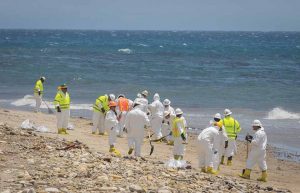Beach closures take toll on Santa Barbara County businesses
IN THIS ARTICLE
- Energy Topic
- Chris Officer and pacbiztimes Author
By Chris Officer and pacbiztimes Friday, May 29th, 2015
The oil spill near Refugio State Beach dealt a financial blow to a handful of businesses with more revenue being lost every day.
Although the total impact on Santa Barbara’s $1 billion tourism industry is likely to be offset by increased hotel stays by cleanup crews, there was no sign of relief for those directly affected.
El Capitan and Refugio state beaches, two of the county’s most popular campsites, have been closed to the public since the May 19 spill occurred, and with no concrete timetable on when the beaches will reopen, some small businesses are left cleaning up the mess.
“We lost 25 people that were booked last weekend,” said Michael Cohen, owner of Santa Barbara Adventure Co., a travel outfitter featuring everything from costal kayaking to horseback riding.
Cohen said that’s not even including all the “walk-ins” who come in that haven’t made reservations. A rate that’s particularly high during holiday weekends dropped off this Memorial Day.
“We could’ve added another 20 people, at least,” Cohen said.
But Cohen said last week’s loss in revenue could be just the tip of the iceberg.
“This weekend’s loss isn’t the true cost, the true cost is how long the beaches will be closed,” Cohen said.
The California Department of Parks and Recreation and other organizations are scheduled to reassess both Refugio and El Capitan on June 4 to make a determination whether or not to reopen the state beaches.
El Capitan and Refugio beaches could remain closed for additional weeks, further impacting businesses like Santa Barbara Adventure Co.
“We take in 1,400 customers a year. Every week the beach is closed, they could take possibly 20 to 100 customers,” Cohen said. “We could lose up to 800 customers between now and October if the beaches were to remain closed.”
Time is of the essence for Cohen’s business. With more than 70 percent of Santa Barbara Adventure Co.’s customers being students on school field trips, having the state beaches open before the fall is vital.
Other businesses, such as 101 RV Rentals, are also feeling negative results from the spill. As the lone contract provider for RV rentals in Refugio and El Capitan campsites, the company returned a handful of refunds during the Memorial Day weekend, but it’s what the future holds that could end up more daunting.
“We did have to refund a couple people this week,” said company manager Melissa Owens. “But that’s just for this week, we’re anticipating more cancellations in the weeks to come.”
Although only two of the Central Coast’s state beaches are closed, they are two of the more popular beaches tourists and businesses rely heavily on.
“Those are our most popular beaches, so a good chunk of our business comes from there,” said Owens. “A lot of people go to El Capitan and Refugio beaches because of the nice bluff and tropical setting. It would be devastating for business if the beaches continue to stay closed for a long period of time.”
But not all Santa Barbara business owners are left singing the blues. Circle Bar B Guest Ranch & Stables was actually getting overbooked, said owner Kathy Brown.
“Basically, it didn’t affect us at all,” said Brown. “We had a very good weekend, very busy – and even had a wait list despite everything.”
In fact, it seems most of the hospitality industry felt little impact from the oil spill, despite national news coverage and declarations of emergency for Santa Barbara County and the Goleta.
Along with Circle Bar B, both the Bacara Resort and the Fess Parker’s DoubleTree Resort said they didn’t experience above-average cancellation rates.
Hotels will be taking full advantage of the influx of workers in the area directly involved in the clean-up.
Noreen Martin, CEO of San Luis Obispo County-based Martin Resorts, expects the impact of the spill to be balanced with recovery efforts.
“There will be probably be a short-term increase in visitation to Santa Barbara from professionals and volunteers who are working on the cleanup,” said Martin. “This probably zeros out any loss of business from leisure travelers.”
A majority of refunds went to would-be-campers with reservations to El Capitan and Refugio campgrounds. With roughly 225 individual campsites between the two parks, which typically run at full capacity, both state beaches are refunding approximately 200 people a week.
A lone bright spot of the ordeal was that campers were notified via ReserveAmerica – an online camping reservation service – almost immediately after the spill was reported. Campsite officials said there were very few campers that had to turnaround at the gate due to the campsite being closed.
Fortunately, the losses in camping fees won’t have much impact on the state. The financial sting smaller businesses receive from state beaches being closed will be much more damaging.
And although business owners like Cohen can stay in the black by offering plenty of services away from the spill site, he fears a national narrative is inaccurately being told which could further bring negative attention to Santa Barbara.
“It’s frustrating that the national media is projecting that all of Santa Barbara was affected, when in fact it was just a small, isolated area,” said Cohen. “As a small business, one thing I want to convey is Santa Barbara is open. That’s the message I’ve been trying to broadcast.”













